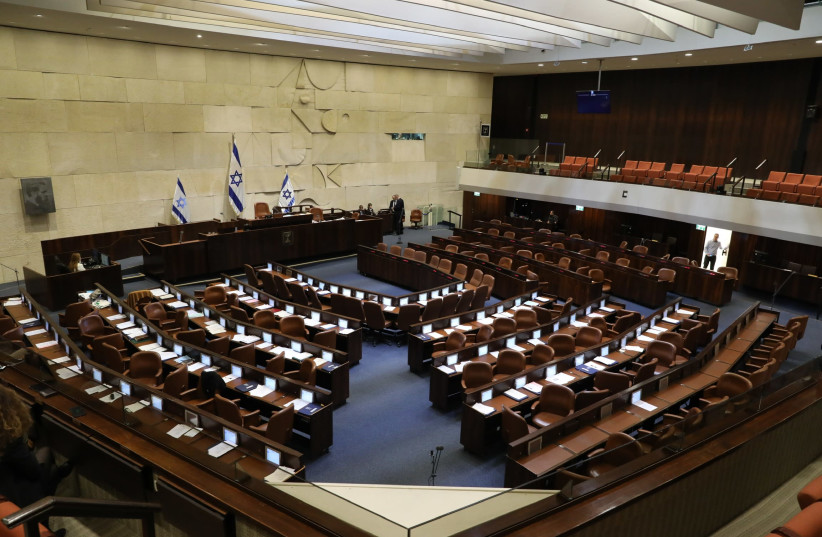As expected, the wild hyperbole that marked this year’s election campaign continues unabated even after all the votes have been counted and the number of Knesset seats allotted.
Before the election, the anti-Netanyahu bloc warned that if Benjamin Netanyahu returned as prime minister – with a bevy of right-wing and religious parties in tow – it would be the end of Israel as a democratic state. On the other side, the pro-Netanyahu bloc warned that if Yair Lapid would retain his job as prime minister, supported by the Center, Left and Arab parties, it would mean the end of Israel as a Jewish state.
The end of the campaign has not lessened the warnings of impending doom, as two different meetings in the Knesset on Monday bear witness.
What were the meetings?
In the first meeting, entitled “Human Rights’ Organizations operated by Hamas,” organized by the right-wing Ad Kan group, Bezalel Smotrich – the head of the Religious Zionist Party expected to take over the Finance Ministry in the next government – said that human rights organizations working against Israel are an “existential threat to the State of Israel.”

Smotrich said that Israel would act against the organizations through “legal and security” means.
“We need to put together a whole basket of tools and put a hand on the funding,” he said. “The State of Israel has enough legal tools. In the face of delegitimization, incitement to terror and the slander that we face, the time has come to respond.”
It was not clear from his comments which organizations Smotrich had in mind. Was he referring to groups like the International Solidarity Movement-Palestine, a radical anti-Israel group mentioned at the conference that has been accused of taking part in violent actions against soldiers and allegedly has links to terrorist organizations? Or was he talking about highly critical NGOs such as Breaking the Silence and B’Tselem, which provide an Israeli backwind to the Boycott, Divestment and Sanctions movement and go around the world blasting Israel in the harshest of terms?
Are they "existential threats"?
Either way, are they really “existential threats?” If they are existential threats, what does that make Iran on the verge of nuclear capability, a super-duper existential threat?
Israel for years has been trying to deal with foreign-funded NGOs that it feels are either supporting terrorism or working to undermine the Jewish state abroad.
In 2016, to much controversy and hand-wringing overseas, the Knesset passed a law requiring foreign-funded NGOs to submit special reports and publicly disclose their funding. In 2020, Smotrich pressed the Knesset Research and Information Center to look into whether the law was being implemented and found that – lo and behold – it was not. The report found that in 2019, only 0.3% of some 39,000 NGOS in the country reported foreign entity funding.
ON MONDAY, Smotrich talked about putting together a basket of tools to deal with the NGOs when some of those tools already exist, but are simply not being used.
When targeting NGOs, however, Smotrich would do well not to go overboard. Israel is a strong enough country to be able to deal with criticism – even deplorable criticism – from NGOs, without shutting down those NGOs. The right-wing incoming government, already perceived abroad by many as just one step removed from the governments in Turkey and Hungary, need not reinforce that perception by going after NGOs that are highly critical but do not engage in violence or have ties to terrorist organizations.
Organizations in the latter category, by the way, were targeted by the outgoing government – the most diverse government in Israeli history, and one that included several Left-wing ministers, such as Merav Michaeli.
In October 2021, the Defense Ministry designated six Palestinian NGOs as terrorist organizations, with a seventh added to the list three months later. These groups included the Defense for Children International-Palestine, Al Haq and the Union of Palestinian Women’s Committees. According to the Defense Ministry, these groups were operated by and for the benefit of the Popular Front for the Liberation of Palestine, a terrorist group.
The move was roundly condemned by international human rights organizations, the European Union, progressives in the US Democratic Party and some liberal US Jewish groups. The government, however, was unfazed, and in August raided and closed down the offices of seven organizations in Ramallah.
All of that happened in a government in which Michaeli was a member. That did not, however, prevent her from saying at an “emergency conference to save democracy” held in the Knesset on Monday that Smotrich was an “existential threat” because he wanted to use the power of the state against human rights organizations, the same powers of state used against questionable NGOs by the government in which Michaeli is a minister.
Referring to Smotrich’s characterization of the human rights organizations as an existential threat, she said, “To think that a Jew would say a sentence like that.... He who calls human rights organizations an existential threat, he and his friends – Smotrich, [Itamar] Ben-Gvir and Netanyahu – are the existential threat to the State of Israel.”
To which one can ask her a similar question asked above: If Smotrich, Ben-Gvir and Netanyahu are existential threats, what does that make Iran on the verge of nuclear capability?
Perspective, people, perspective. Not every organization or person one disagrees with is an existential threat. Saying that they are dilutes the true meaning of the term at a time when Iran may genuinely become one in the near future. It’s always helpful to call a spade a spade. It’s disingenuous, however, to call a spoon a spade, or to call every problem and challenge an “existential threat.”
